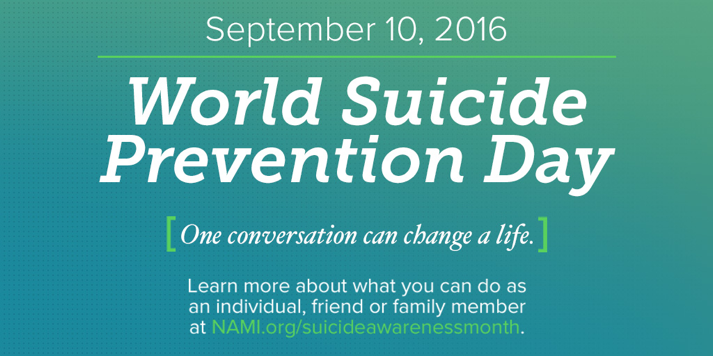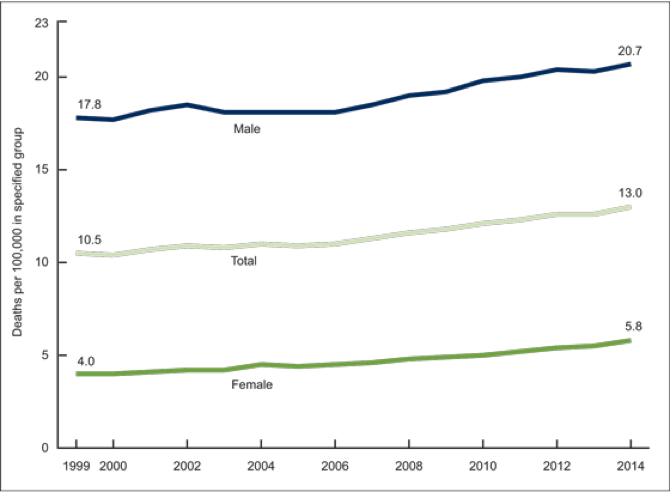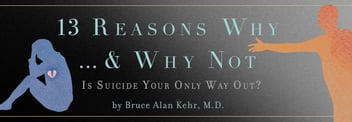Help Prevent Suicide in Someone You Care About
- Home
- Blog

Not to be overshadowed by the fifteenth anniversary commemorating those who perished from terrorist attacks on 9/11, September 10th highlighted another significant cause of death that devastates our country year after year —SUICIDE.

On September 10, 2016 we observed World Suicide Prevention Day in order to reach out to those affected by suicide, raise awareness, and connect individuals at-risk of harming or killing themselves to treatment services.
Over 40,000 people die by suicide each year in the United States
Over 40,000 people die by suicide each year in the United States (and 800,000 worldwide). After a period of nearly consistent decline in suicide rates in the United States from 1986 through 1999; from 1999 through 2014 the age-adjusted suicide rate in the United States increased 24%, from 10.5 to 13.0 per 100,000 population, with the pace of increase greater after 2006. While it is the 10th leading cause of death for the US population overall, it is the 3rd leading cause of death in young people. It is arguably the most preventable cause of death.

Family and friends are often the first to recognize the warning signs of suicide
Dr. Mark Novitsky points out that often, family and friends are the first to recognize the warning signs of suicide and can be instrumental in helping an at-risk individual find treatment with someone who specializes in diagnosing and treating mental health conditions. Dr. Novitsky recommends that you look for the presence of one or more of these signs, including:
- Speaking about wanting to die or wanting to kill themselves
- Talking about feeling empty, hopeless, or having no reason to live
- Making a plan or looking for a way to kill themselves, such as searching online for methods to commit suicide, stockpiling pills, or buying a gun
- Talking about feelings of intense guilt or shame, feeling trapped
- Feeling hopeless – that there are no solutions to their problems
- Experiencing unbearable emotional or physical pain
- Talking about feeling like a burden to others
- Using alcohol or drugs to excess
- Acting anxious or agitated
- Withdrawing from family and friends
- Changing eating and/or sleeping habits
- Showing rage or talking about seeking revenge
- Excessive risk-taking that could lead to death, such as driving extremely fast
- Talking about or frequently thinking about death
- Displaying extreme mood swings, suddenly changing from very sad to very calm or happy
- Giving away valued possessions
- Saying goodbye to friends and family
- Putting affairs in order, making a will
If one or more of these signs is present in someone you care about, ask them directly how they are feeling, and whether they feel like hurting themselves, or that their life is not worth living. Asking these important questions will not trigger a suicide attempt, and may help the individual feel less alone with their emotional pain.
Suicide does not discriminate
It has been said that Suicide does not discriminate – all genders, ages, and ethnicities can be at risk. Suicidal behavior is complex and there is no single cause. That being said, research has found that about 90% of individuals who die by suicide experience mental illness. The National Alliance on Mental Illness (NAMI) recognizes a number of other risk factors, including:
- A family history of suicide.
- Substance abuse and Intoxication.
- According to NAMI More than one in three people who die from suicide are found to be currently under the influence.
- Access to firearms.
- A serious or chronic medical illness.
- Gender. Although more women than men attempt suicide, men are four times more likely to die by suicide – though women are increasingly seeking lethal means.
- A history of trauma or abuse.
- Prolonged stress or significant loss
- Social isolation.
- Age.
People under age 24 or above age 65 are at a higher risk for suicide.
If You Know Someone in Crisis – Call the toll-free National Suicide Prevention Lifeline
If You Know Someone in Crisis – Call the toll-free National Suicide Prevention Lifeline at 1-800-273-TALK (8255), 24 hours a day, 7 days a week. The service is available to everyone. The deaf and hard of hearing can contact the Lifeline via TTY at 1-800-799-4889. All calls are confidential. Treatment with a mental health professional may be warranted. Scientific research has proven the benefit of a number of treatment strategies that have worked well for mental health conditions related to suicide such as depression and anxiety, or panic disorder. Often, psychotherapy (including CBT or DBT) and/or medications can be life saving. If you or someone you know is at-risk, the time to seek help is NOW!
.png?width=144&height=144&name=Untitled%20design%20(34).png)



